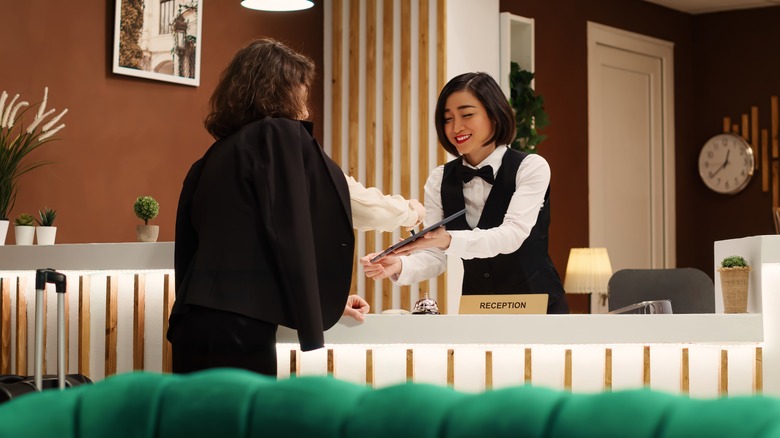Avoid Making This Dangerous Hotel Keycard Mistake
You might still use a standard metal key to enter your home, but you can't expect the same when you enter a hotel room. Aside from the charming bed and breakfasts tucked away in the countryside, the majority of hotels and accommodations worldwide have embraced the convenience of keycards. After all, not only do they grant immediate access to your room with a mere swipe or tap, but they function as keepsakes, too. Now, it goes without saying that keeping your keycard readily accessible during a hotel stay is crucial. But another important tip to remember is to avoid storing your keycard in its default paper sleeve, at least whenever you step outside the room.
Anna Greenberg, a lawyer who has helped people take legal action against hotels, explained in a TikTok video that getting rid of the sleeve or holder helps ensure your safety. It's common practice for many hotels to write your room number, name, and other information on them. "That way, if you lose it and someone else picks it up, they won't know what room you're staying in," Greenberg explained via the clip.
Unless your keycard sleeve lacks any pertinent data that links you to your room, you may want to ditch it and store the card elsewhere instead. Tucking it into your pocket, wallet, or purse sans the sleeve keeps it secure and indirectly enhances your safety during your trip.
What to do if you accidentally lose your keycard
In the event you do lose your keycard, on its own or with its holder, inform the hotel immediately. The concierge should be able to provide you with a replacement. However, be aware that some hotels might charge a fee for this service, typically ranging from $10 to $50, so be prepared to pay just in case.
Should your keycard be lost along with its holder containing your personal information, you may want to request a room change for added peace of mind. All you have to do is ask — politely, of course. "With people who work in hospitality, there's something in our DNA that wants to make you happy," Michael Fazio, a career concierge, shared with NBC News. "And when there's a humanness with the communication, everyone will work harder to make you happy. ... If you ask in person and you make it personal, chances are, they're going to want to help you."
Additionally, if you're concerned about a potential security breach due to your lost keycard, Mickey Shkatov, a security researcher, assured people via USA Today that there's usually zero sensitive information stored in hotel keycards that could allow a stranger to trace you. "You've got nothing to worry about. There's nothing on here at all except the room number and a date field," he told the publication.
Try asking for a mobile key instead
Are you not too confident about your safekeeping abilities? Check if your hotel offers mobile key entry in rooms. A growing number of establishments are upgrading their apps to include features like digital keyless entry. "Mobile apps started as little more than condensed websites adapted for phone screen real estate," Robert Cole, senior research analyst for lodging and leisure travel, said via PhocusWire. "They then added booking engines, touchless check-in, mobile key, guest messaging, food ordering, Wi-Fi access, folio settlement, guest reviews and reward program management."
Travel influencer Sarah Adekola demonstrated how convenient mobile keys are in a TikTok video, showing how it only takes a quick tap from your smartphone to get in your room. "Ditch your hotel keycard and get a digital card on your phone," she said. "Hotels like Marriott and Hilton enable you to have a mobile key, and you just need to put your phone up to the door, and it will allow you access."
Unfortunately, not all hotels offer this, so it's worth checking for convenience. Otherwise, keep your physical keycard within easy reach to avoid misplacing it. You may even want to attach it to a lanyard that you hang around your neck to ensure it's always with you.

